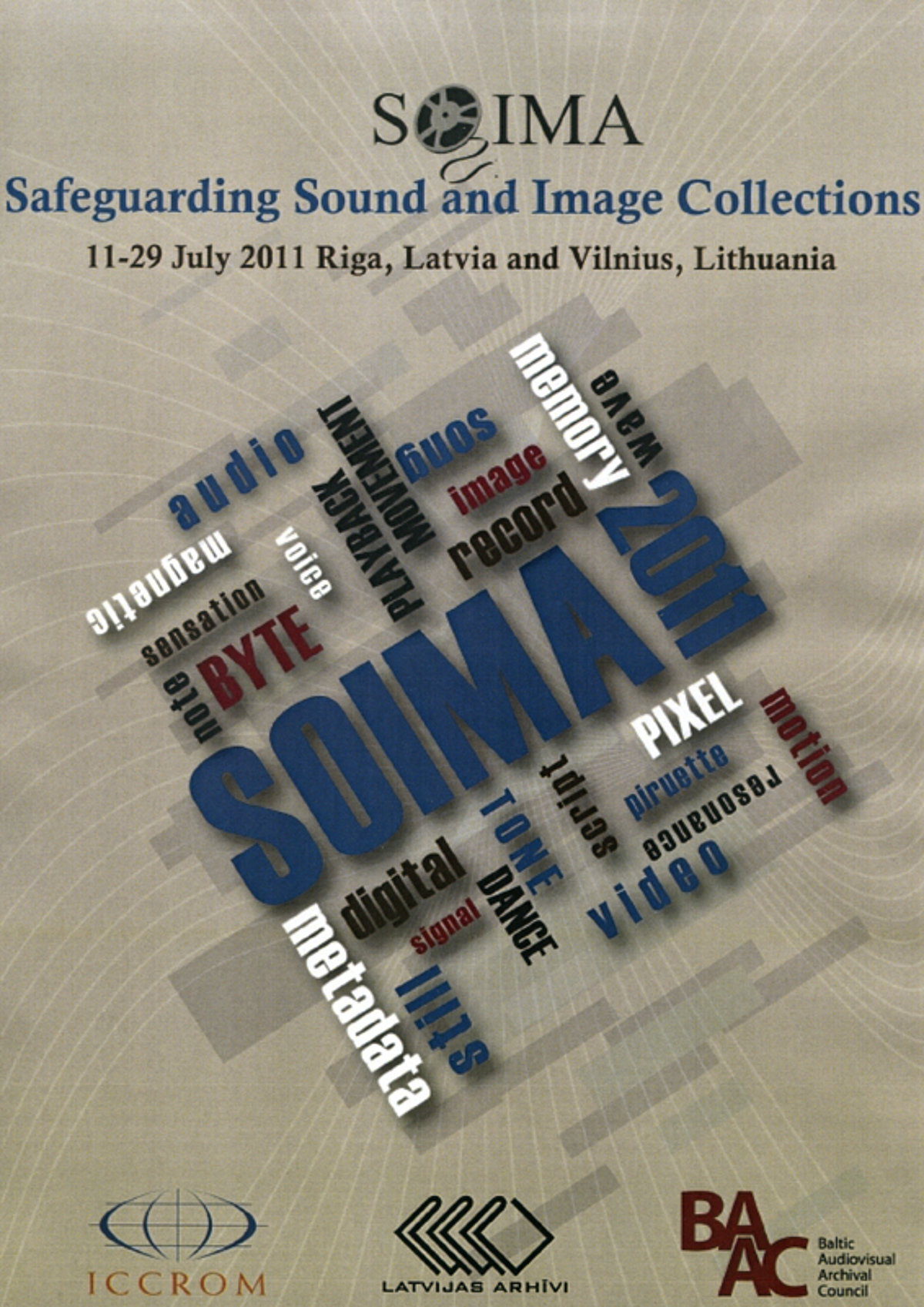
Dates: 11 - 29 July 2011
Organisers:
The course will provide an overview of issues related to the preservation and access of sound and image materials e.g., photographs, films, video and audiotapes, and digital materials. It will discuss the value, meaning, selection and use of sound and image collections in various institutional contexts, exploring the potential of sound and image media in transmitting knowledge and cultural traditions. Initial sessions will especially focus on identification of various formats including the playback equipment, life expectancy of media and ways of detecting deterioration. Additional course topics will include: current knowledge and practices for documenting and cataloguing, media handling and storage, risk assessment of collections, emergency preparedness and response, criteria and technologies for migration and reformatting, planning preservation projects, outsourcing options, digital preservation and management. Other issues such as curating and access, copyright laws, legal deposit, and institutional and national preservation policies will be discussed in context with participants´ working realities. Adaptation to technological changes and related cost-effective preservation strategies will form a key component of the course.
At the end of the course, participants will be able: to recognize materials and media in their sound and image collections, to identify risks and make informed choices for preservation and access. They will have improved their skills to communicate effectively across disciplines and to work in teams.
The course will comprise lectures, a variety of group activities, practical sessions, case studies and site visits. Significant time will be allocated for independent consultation with the course team. Case studies for the course will be based on participants´ inputs and will address issues and challenges identified by them. Thus, active involvement of participants will be sought during the course preparation phase. A follow-up programme, will involve working on self-defined initiatives in participants´ home institutions and communicating as well as networking through a platform supported by the organizers.
The course is aimed at professionals working with mixed collections that have sound and image records of national or regional significance. In particular, it will interest archivists, collection managers, conservators, curators and librarians in charge of preserving such collections in various cultural institutions around the world. It will also interest Information Technology professionals working on projects involving digitization of sound and image collections or allied professionals and managers working for broadcasting institutions. Preference will be given to people actively involved in teaching and advising.
Teaching team
International team of recognized experts identified through professional networks of the partners.
Working language: English
Organisers:
- ICCROM (International Centre for the Study of the Preservation and Restoration of Cultural Property)
- National Archives of Latvia
- The Baltic Audiovisual Archival Council (BAAC)
- University of Latvia
- Lithuanian Central State Archive
- Latvian National Library
- Estonian Film Archives
The course will provide an overview of issues related to the preservation and access of sound and image materials e.g., photographs, films, video and audiotapes, and digital materials. It will discuss the value, meaning, selection and use of sound and image collections in various institutional contexts, exploring the potential of sound and image media in transmitting knowledge and cultural traditions. Initial sessions will especially focus on identification of various formats including the playback equipment, life expectancy of media and ways of detecting deterioration. Additional course topics will include: current knowledge and practices for documenting and cataloguing, media handling and storage, risk assessment of collections, emergency preparedness and response, criteria and technologies for migration and reformatting, planning preservation projects, outsourcing options, digital preservation and management. Other issues such as curating and access, copyright laws, legal deposit, and institutional and national preservation policies will be discussed in context with participants´ working realities. Adaptation to technological changes and related cost-effective preservation strategies will form a key component of the course.
At the end of the course, participants will be able: to recognize materials and media in their sound and image collections, to identify risks and make informed choices for preservation and access. They will have improved their skills to communicate effectively across disciplines and to work in teams.
The course will comprise lectures, a variety of group activities, practical sessions, case studies and site visits. Significant time will be allocated for independent consultation with the course team. Case studies for the course will be based on participants´ inputs and will address issues and challenges identified by them. Thus, active involvement of participants will be sought during the course preparation phase. A follow-up programme, will involve working on self-defined initiatives in participants´ home institutions and communicating as well as networking through a platform supported by the organizers.
The course is aimed at professionals working with mixed collections that have sound and image records of national or regional significance. In particular, it will interest archivists, collection managers, conservators, curators and librarians in charge of preserving such collections in various cultural institutions around the world. It will also interest Information Technology professionals working on projects involving digitization of sound and image collections or allied professionals and managers working for broadcasting institutions. Preference will be given to people actively involved in teaching and advising.
Teaching team
International team of recognized experts identified through professional networks of the partners.
Working language: English

 CONFERENCE
CONFERENCE